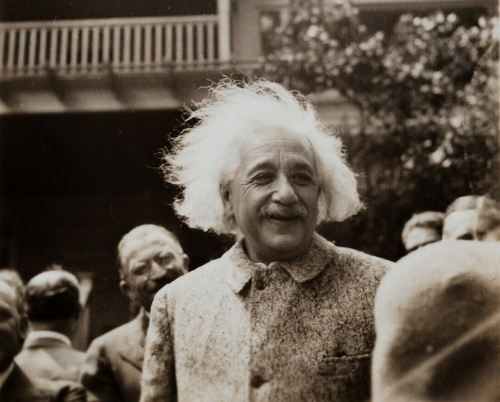Seeing himself as a man of reason, Einstein often expressed his belief that anyone carrying the gift of intelligence should also have an obligation to use it for the improvement of the world.
 Einstein was a pacifist. He spoke about pacifism and the dangers of the growing martial thinking of governments as early as 1912. Einstein called his brand of pacifism “militant pacifism”, and tried to draw a distinction between the view that pacifism is weak as opposed to his more active definition - a responsibility to educate our children about the dangers of war.
Einstein was a pacifist. He spoke about pacifism and the dangers of the growing martial thinking of governments as early as 1912. Einstein called his brand of pacifism “militant pacifism”, and tried to draw a distinction between the view that pacifism is weak as opposed to his more active definition - a responsibility to educate our children about the dangers of war.When asked after World War II whether violence was just a part of the human condition and therefore inevitable, Einstein said – while violence was undoubtedly part of human nature, it was our responsibility to channel and control that destructive impulse and to build institutions to allow for peaceful rather than violent resolutions to conflicts.
Later in his life, he became involved with various groups specifically focused on promoting peace. He worked with the Jewish Peace Fellowship, a group founded in 1941 to support Jews who didn’t wish to serve in the military. Einstein believed that every citizen had a right to chose their own appropriate path where warfare was concerned and not to be forced to serve.
There is a wonderful little book on the shelf called 101 Things You Didn’t Know about Einstein. His influence in science and politics has shaped the past century and changed the way we view the world. It’s a pleasure to learn more about the man behind E=MC2.
10 comments:
Hi Lisa, I am actually thankful for this post. I had one of his books I ordered through mail, I though that it will be about science, but no it was about his his personal thoughts. I think I still have somewhere, and probably will be digging out to read it again. Thanks, Anna :)
Anna,
The book I mentioned is full of interesting facts about him and his views on life. It done in short essays so it's an easy and quick read.
Glad you liked the post.
Peace,
Lisa
Hi Lisa,
This is a wonderful post. I didn't know about Einstein's "militant pacifism" but it's another reason to admire him. I'll definitely check out the book.
In the book you even get to read speculations about Einstein's sex life..whoo hoo..lol. I probably could have lived without that section..:)
Thanks Francis. I always look forward to your input.
Lisa
Greatness has no bounds.
Neo,
Well put and we can all reach for that greatness.
Thanks,
Lisa
Einstein had a lot of E=mC2 (energy) and he opposed the use of he atomic bomb!
Debbie,
Yes he did oppose the atom bomb. One section of the book 101 things...said that later when he talked about Pres. Roosevelt coming to him and asking if the atom bomb was possible he wished he'd said no.
Thanks for commenting..come back again and join in the discussion..:)
Peace,
Lisa
Very interesting, Lisa! I agree with him about pacifism not necessarily being a sign of weakness. Rather, it comes down to making a conscious and informed choice to avoid the total waste and destructiveness of war.
Lynda,
Absolutely. War is a waste of human life on all fronts.
Thanks for the comment.
Peace,
Lisa
Post a Comment